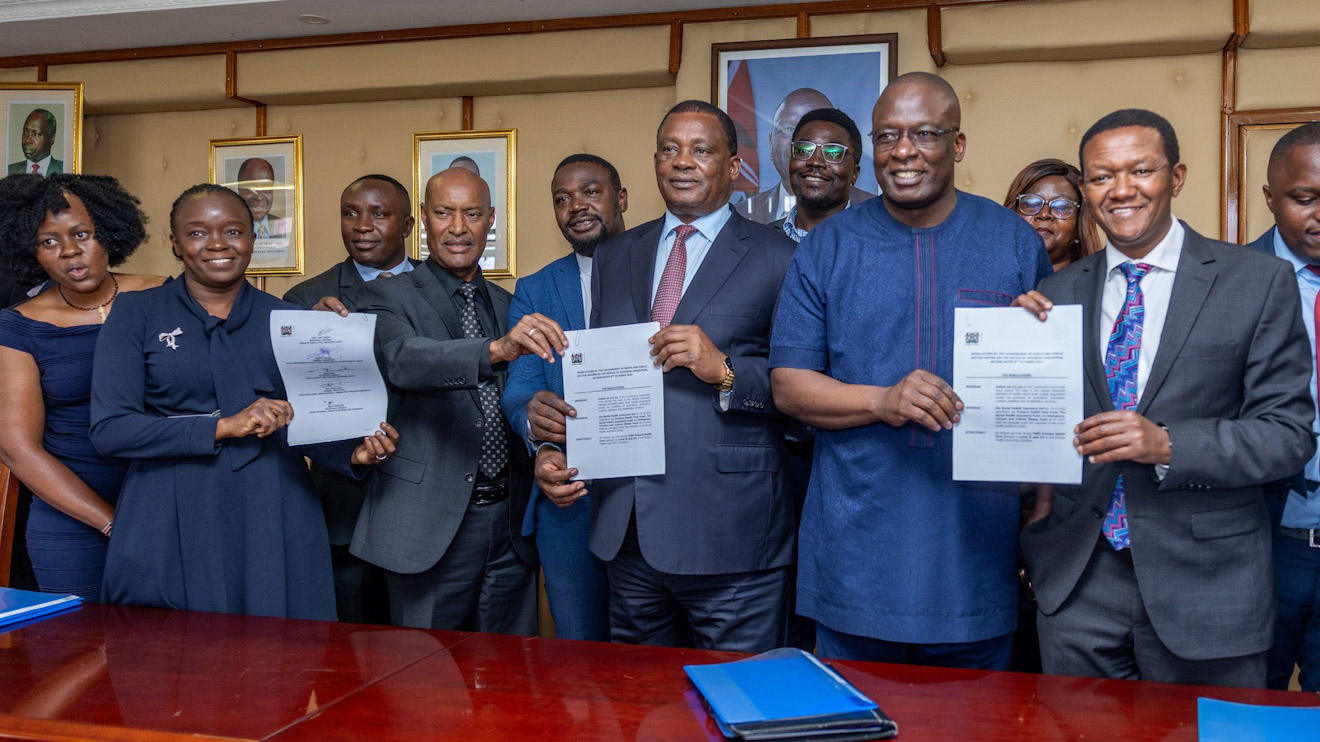A looming nationwide strike by public sector unions has been averted following a decisive agreement between the government and union leaders, addressing union grievances about the transition from the National Health Insurance Fund (NHIF) to the Social Health Authority (SHA).
The agreement, reached at a meeting held at Harambee House, Nairobi, included key figures such as Public Service Cabinet Secretary Justin Muturi, Labour CS Alfred Mutua, and Health CS Debra Mulongo Barasa.
Union of Kenya Civil Servants Secretary-General Tom Odege, representing the unions, expressed relief at the government’s response.
“It is not in our interest to call strikes, but we do so to make the employer respond to our concerns,” Odenge stated.
“The government has now responded, and we are therefore calling off the strike.”
Read More
Union members had previously issued a 14-day strike notice on October 8, raising issues about the lack of comprehensive medical cover for public servants, the future of NHIF employees, and a proposed increase in monthly health contributions to 2.75 per cent of gross salaries without corresponding improvements in benefits.
As part of the resolution, the Ministry of Public Service committed to extending the current medical insurance scheme for public servants under SHA until November 21, 2024, ensuring uninterrupted healthcare access for workers beyond this date.
An ad-hoc committee will also be established to facilitate a smooth transition for NHIF employees, in line with the Social Health Insurance Act (2023), the Employment Act (2007), the Labour Relations Act, and existing collective bargaining agreements.
Additionally, all pending legal actions related to the transition will be put on hold as both parties engage in good-faith negotiations.
Speaking at the signing, CS Justin Muturi commended the unions’ willingness to cooperate, reaffirming the government’s dedication to maintaining essential health services for civil servants.
“We will work with everyone involved to ensure that all civil servants entitled to a medical cover receive seamless service delivery,” Muturi said, adding that SHA leaders would be urged to address any transition-related challenges.
On his part, Labour CS Alfred Mutua encouraged union leaders to prioritise negotiation over industrial action.
“Before calling a strike, I urge unions to declare a dispute and engage in negotiations. Issues can be resolved amicably. I will listen and act as an intermediary between employers and employees,” Mutua said.
Health CS Debra Barasa echoed these sentiments, emphasising the government’s commitment to delivering affordable, accessible, and efficient healthcare through SHA.
The Social Health Insurance Act (2023) establishes several targeted funds under SHA: the Primary Health Care Fund, which enables free treatment for registered patients at dispensaries and health centres; the Social Health Insurance Fund (SHIF), providing comprehensive outpatient, inpatient, and emergency care for enrolled members, as well as coverage for critical illness and major surgeries; and the Emergency, Chronic, and Critical Illness Fund, covering severe conditions such as cancer, kidney disease, severe hypertension, and diabetes.
The agreement garnered the support of key unions, including the Union of Kenya Civil Servants, the Kenya Medical Practitioners, Pharmacists and Dentists Union (KMPDU), and the Kenya National Union of Nurses and Midwives, alongside other representative groups for clinical officers, nutritionists, laboratory officers, and county government workers.
The move reflects an unprecedented collaboration between unions and government, as they work together to establish a health system envisioned to protect and serve public sector employees well into the future.











